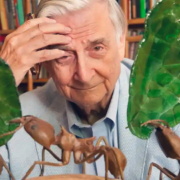Edward O Wilson; the real Ant Man
…his insights will be missed
Edward O Wilson, a US naturalist known to some as the “modern-day Darwin”, died on Sunday at the age of 92 in Massachusetts. Alongside the British naturalist David Attenborough, Wilson was considered one of the world’s leading authorities on natural history and conservation.
Wilson had warned many times that humans can not continue to use the land and resources of the planet absent of environmental and social consequences.
The insightful biologist was caught up in controversies at times during his career. Nevertheless, he warned that “we live in a delusional state” if we do not understand the burden that the western way of life imposes on Earth. A warning that rings true, especially as the consequences of human-induced climate change continue to increase.
 Wilson has been called “the father of sociobiology” and “the father of biodiversity” for his environmental advocacy. Among his contributions to ecological theory is the theory of island biogeography (developed in collaboration with the mathematical ecologist Robert MacArthur), and has served as the foundation for conservation area design, as well as the unifying theory of biodiversity of Stephen P. Hubbell.
Wilson has been called “the father of sociobiology” and “the father of biodiversity” for his environmental advocacy. Among his contributions to ecological theory is the theory of island biogeography (developed in collaboration with the mathematical ecologist Robert MacArthur), and has served as the foundation for conservation area design, as well as the unifying theory of biodiversity of Stephen P. Hubbell.
“If all mankind were to disappear, the world would regenerate back to the rich state of equilibrium that existed 10,000 years ago. If insects were to vanish, the environment would collapse into chaos.” E.O. Wilson
Wilson came to think of nature as his favorite companion and spent hours prowling forests, streams and swamps, observing wildlife. A childhood fishing accident left his vision so impaired that he could not observe larger animals from a distance. Instead, he concentrated on smaller creatures, and foremost, ants. Wilson’s studies and findings revealed how nature’s smallest of creatures exist, and how their social hierarchy resembled humans in some ways, but also greatly differed in other ways, especially in living in balance with their natural environment.
There are thousands of different species of ant, no one is sure since most of them are unknown to science, and perhaps a hundred million billion of the creatures are alive at any one time living in colonies of elegant social complexity. Humanity still has lessons to learn from Earth’s smallest of creatures, and one outstanding lesson is working together to ensure the survival of the colony.




Leave a Reply
Join the Community discussion now - your email address will not be published, remains secure and confidential. Mahalo.